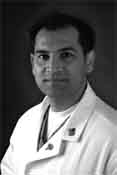 | As’ad Ehtisham, MD, Medical Director,Neuroscience Critical Care, Cerebrovascular Diseases and Stroke,Via Christi Regional Medical Center, is the only board-certified neurologist in this area who is fellowship-trained in both cerebrovascular diseases and advanced neuroscience critical care. He received his medical degree from King Edward Medical College, Pakistan, in 1992 and completed his residency in Neurology at the University of Kentucky in 2003. His two additional fellowships were completed in 2005 at Emory University Hospital, Atlanta.Ehtisham’s areas of special interest include management and research in cerebral venous thrombosis and aneurysmal subarachnoid and intracerebral hemorrhages. |
Health & Medicine
2007-02-01 13:10:00
What to do if you are having a stroke
I am really afraid of having a stroke, even though I try to eat right and exercise. What can I do if I think I’m having a stroke?
ANSWER: Stroke is a deadly brain attack and America's third-leading killer. It’s also the No. 1 cause of serious, long-term disability. Anyone can have a stroke, regardless of age or gender.
Of course, eating a healthy diet and exercising is a good start. But, because strokes can happen fast and the symptoms come on suddenly, be sure to learn these warning signs of stroke:
• Numbness or weakness of the face, arm or
leg, especially on one side of the body
• Confusion, trouble speaking or trouble
understanding
• Trouble seeing in one or both eyes
• Dizziness, loss of balance or coordination
or trouble walking
• Severe headache with no known cause
Fortunately, we have the best stroke care in Kansas right here in Wichita, which has the only Joint Commission on Accreditation of Healthcare Organizations-certified Primary Stroke Center in Kansas. If EMS personnel see you are having a stroke, they will automatically take you there.
A lot has been learned about lessening the severity of stroke, including the use of clot-busting medications within three hours of the onset of stroke symptoms. The local Primary Stroke Center, however, can extend that time to six hours by taking the patient into the angio suite and delivering the same “clot buster” medication directly to the clot in the brain. Hence the expression, “Time is brain.”
That’s why, in a hospital with an acute stroke response team, members gather in the Emergency Room moments after being notified, to pool their expertise to make important decisions about care when time is critical.
Advances in diagnostics, neurosurgery and rehabilitation — all available locally —allow highly skilled specialists to direct the best of care for stroke patients at every degree of severity and level of recovery.
If you’d like to learn more about stroke, call 689-5700 to have a copy of “Stroke: Why They Call It Brain Attack,” a free 30-minute audio tape, sent to you.


